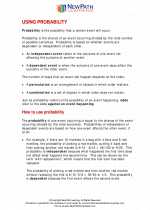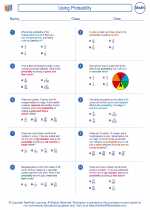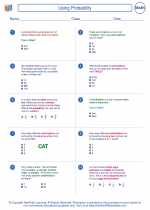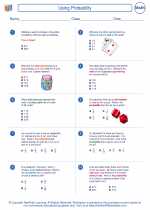Expressions
What is an Expression?
An expression is a mathematical phrase that combines numbers, variables, and operators (such as +, -, *, /) to represent a value. Expressions can be as simple as a single term or as complex as a combination of multiple terms.Types of Expressions
There are several types of expressions, including:- Numerical Expressions: These are expressions that contain only numbers and mathematical operations. For example, 5 + 3 * 2.
- Variable Expressions: These are expressions that contain variables (such as x, y, etc.) in addition to numbers and mathematical operations. For example, 2x + 3y - 7.
- Algebraic Expressions: These are expressions that contain variables, numbers, and mathematical operations. They often represent real-life situations or problems. For example, 3x + 2y - 5z.
Parts of an Expression
An expression typically consists of the following parts:- Terms: These are the individual parts of the expression that are separated by addition or subtraction. For example, in the expression 3x + 2y - 5z, the terms are 3x, 2y, and -5z.
- Variables: These are symbols that represent unknown or changing quantities. They can be combined with numbers and operators to form expressions. For example, in the expression 2x + 3y - 7, x and y are variables.
- Coefficients: These are the numerical factors of the variables in an expression. For example, in the expression 4x + 2y, 4 and 2 are the coefficients of x and y, respectively.
- Constants: These are fixed values that do not change within a given context. For example, in the expression 2x + 3y - 7, 7 is a constant.
Operations with Expressions
You can perform various operations with expressions, including addition, subtraction, multiplication, and division. It's important to understand the order of operations (PEMDAS: Parentheses, Exponents, Multiplication and Division, Addition and Subtraction) when simplifying or evaluating expressions.Examples
Let's look at some examples of expressions:- Example 1: Numerical Expression
- Expression: 5 + 3 * 2
- Solution: 5 + 6 = 11
- Example 2: Variable Expression
- Expression: 2x + 3y - 7
- This is a variable expression with terms 2x, 3y, and -7.
- Example 3: Algebraic Expression
- Expression: 3x + 2y - 5z
- This is an algebraic expression with variables x, y, and z.
Study Guide
To master the topic of expressions, it's important to:- Understand the difference between numerical, variable, and algebraic expressions.
- Identify the parts of an expression, including terms, variables, coefficients, and constants.
- Practice simplifying and evaluating expressions using the order of operations.
- Work on solving problems and real-life situations using algebraic expressions.
◂Math Worksheets and Study Guides Seventh Grade. Using Probability
Study Guide Using Probability
Using Probability  Worksheet/Answer key
Worksheet/Answer key Using Probability
Using Probability  Worksheet/Answer key
Worksheet/Answer key Using Probability
Using Probability  Worksheet/Answer key
Worksheet/Answer key Using Probability
Using Probability 

 Worksheet/Answer key
Worksheet/Answer key
 Worksheet/Answer key
Worksheet/Answer key
 Worksheet/Answer key
Worksheet/Answer key

The resources above cover the following skills:
Data Analysis and Probability (NCTM)
Understand and apply basic concepts of probability
Compute probabilities for simple compound events, using such methods as organized lists, tree diagrams, and area models.